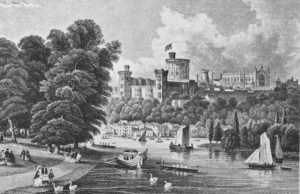
It is now almost an axiom of the theory of economic development that the route to affluence lies by way of an industrial revolution.
–Phyllis Deane
The world can be divided into rich and poor areas due to the cumulative differences in their rates of economic growth. In 1980, the Independent Commission for International Developmental Issues of the World Bank, led by former Chancellor of West Germany Willy Brandt, established a visual depiction between strong and poor economies now called the “Brandt Line”.
These differences have their roots in the processes of modern industrial capitalism, which began in England in the second half of the 18th century. Before that time, most nations shared a slow degree of economic growth, which manifested itself in the lack of adequate living standards.
But then, the Industrial Revolution began. And some specific regions of the world started developing themselves at a faster rate than others, which were economically left behind. This economic improvement was the result of the foundation of large-scale businesses in the manufacturing sector. On the socio-economic side, a man’s future born before this period was determined by the cradle he rested on while he was a child: it was an inheritance from his ancestors. If he was born poor, he was probably going to remain poor, and if he was born into nobility, the title and the associated properties remained with him and passed onto his descendants.
A question worth reflecting is: why did this remarkable phenomena happen in England, and not in a more advanced country such as France, which had at the time a higher degree of culture and economic prosperity?
One factor that might be considered is religion. The Protestant religion played a favourable role in the perception of wealth and trade, while the Catholic countries had a tendency to suppress the will to acquire money. As evidence, in places like France, a tradesman was not as well perceived as a bourgeois professional, such as a lawyer or a physician.
The presence of a power class of merchants (who had acquired knowledge of this skill because of their experiences in overseas trading) was a powerful element to develop the capitalist system into England. Besides this, the presence of new commercial partners in the new American colonies and the deposition of the Catholic King James II in favour of his daughter Mary II during the Glorious Revolution of 1688 created a shift in the general perception of society towards the use of capital and the enlargement of competitive markets.
The British Agricultural Revolution, which began in the 18th century and progressively made changes to the agricultural techniques used (like crop rotations, fallow grounds and new methods to improve the breed of animals), also provided a connection to the discovery of new important techniques which constituted the base of this nascent capitalism.

On the political side, due to special Acts emitted by the Parliament of Great Britain, a new class of landowners emerged when they were granted possession of lands, used by them to raise crops. These lands were massively cultivated with the help of the new agricultural methods and were also leased to tenant farmers. This brought two particular consequences: first, it led to a surplus of food. Second, a great number of peasants lost their capacity to support themselves with their traditional use of land and therefore, had to seek outlets for their labour in places that could be away from their native environment.
Another phenomenon worth remarking on was the introduction of the factory system during this period. The merchant-capitalists equipped them and hired capable workers, This increased division of labor prompted a process of permanent technological change which has deep consequences still today.
Factory production in turn created a powerful incentive to design and create improved machines, which allowed the further saving of labour while increasing the capacity to produce a major quantity of goods. This also allowed for new merchandise, new processes, and new specialisations in turn.
The introduction of this factory-based production allowed capitalists to create new fortunes while making cheaper products. This was the gateway to a new phase of production, where an individual enterprise grew their operations by saving capital, while still providing employment to more and more workers, and where the profits were redirected back into the business to increase its rate of growth.
Edgar Pereira works at the Elite Digital Marketing and is a Writing Fellow with Fellowship for Freedom in India.

READER COMMENTS
Mark Brady
Aug 14 2022 at 7:08pm
Here are some observations, and I recognize that the author would not necessarily disagree with what I have written below.
1. There is no mention of the Industrious Revolution that began in the late seventeenth century in the Netherlands and then England, and later spread to other parts of north-western Europe. The Industrious Revolution describes an increase in the hours of labor (and a reduction of leisure time) that began in the late seventeenth century and continued into the nineteenth century as people came to value monetary income relatively more highly than leisure. See Jan de Vries’s The Industrious Revolution: Consumer Behaviour and the Household Economy, 1650 to the Present (Cambridge University Press, 2008).
2. The Agricultural Revolution began in the Netherlands and then spread to England and elsewhere in Europe. The province of Holland was the first region in seventeenth-century Europe to have a majority of its population living in towns and cities.
3. It is not obviously the case that eighteenth-century France had “a higher degree of economic prosperity” for the reasons cited in nos. 1 & 2 above.
4. An interesting question is why did England and not the Netherlands inaugurate the Industrial Revolution. Indeed, the Netherlands was relatively late in industrializing (the second half of the nineteenth century).
5. “On the political side, due to special Acts emitted by the Parliament of Great Britain, a new class of landowners emerged when they were granted possession of lands, used by them to raise crops. These lands were massively cultivated with the help of the new agricultural methods and were also leased to tenant farmers. This brought two particular consequences: first, it led to a surplus of food. Second, a great number of peasants lost their capacity to support themselves with their traditional use of land and therefore, had to seek outlets for their labour in places that could be away from their native environment.”
I assume this is a reference to the Enclosure Acts, of which many were passed in the sixteenth century and many more in subsequent centuries, and which dispossed the tenant farmers of age-old rights to cultivate, and to graze livestock on, the commons. The Enclosure Acts did not always lead to an increase in agricultural production, and were not the only reason why the agricultural labor force moved to the industrializing towns in the late eighteenth and early nineteenth centuries.
6. The emergence of capitalism in the sixteenth and seventeenth centuries preceded the process of industrialization.
7. The extension of the division of labor in the seventeenth and eighteenth centuries preceded the process of industrialization.
John (Jack) Estill
Aug 15 2022 at 5:51pm
Was the institution of tax farming in France another reason that French agriculture was slow to industrialize, leaving France less prosperous than it might otherwise appear?
Comments are closed.